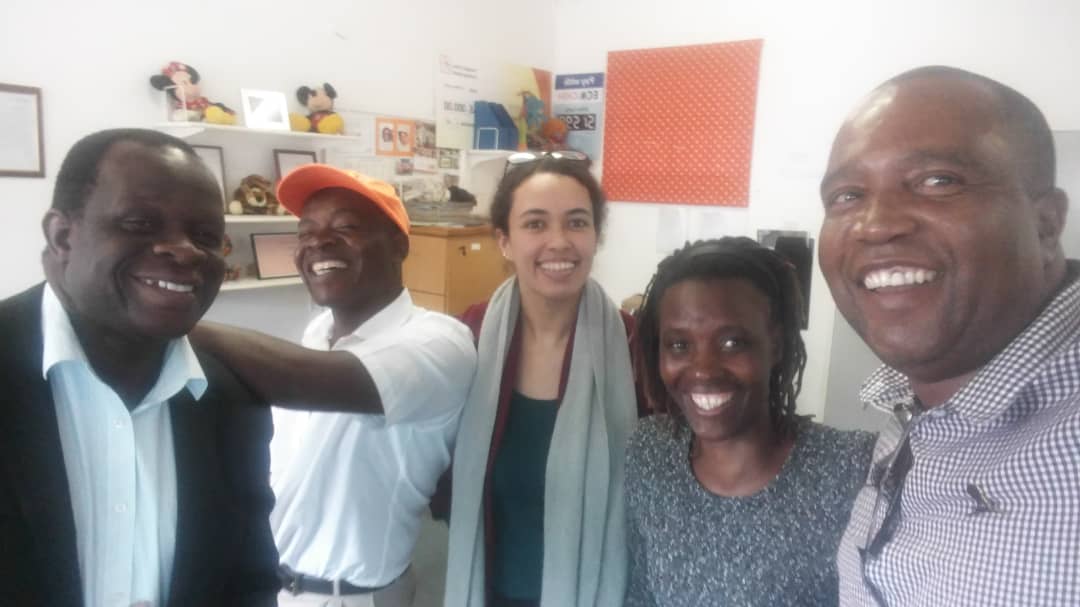AfID volunteers Adelina and Giada featured in CIMA's FM Magazine03.05.2019
Volunteer accountants expand their horizons
Financial management is not always about the paycheque.
Accounting and financial management skills are a critical need for some nonprofit organisations, but they don’t always have the resources to access world-class financial professionals. One organisation is trying to change that and, along the way, give management accountants a chance to discover new insights about themselves and their work.
Accounting for International Development (AfID) is a UK-based organisation that matches accountants with volunteer assignments at nonprofits around the world. Since it was founded by Neil Jennings in 2009, AfID has matched more than 1,300 accountants with over 500 nonprofit partners around the world, including hospitals, micro-finance institutions, conservation projects, women’s empowerment programmes, and schools.
“Ten years on from when we first started, and in an era of decreasing foreign aid and rising donor scepticism, the need for sound financial management has never been so clear,” Jennings said in a press release.
Here are the experiences of just two recent volunteers with AfID:
Giada Baldi, 31, ACMA, CGMA, from Florence, Italy, currently based in London, with extensive experience in operational, management, and project accounting within the private and public sector.
Assignment: Spent three weeks in Zimbabwe in January 2019 with AfID NGO partner, Kidzcan, which offers specialist support to children with cancer in Zimbabwe. The organisation provides help with diagnostics and access to the right treatments and specialist medical care, as well as psychological support and training for medical professionals on basic cancer care. To see more of Baldi’s experiences with the organisation, visit her blog chronicling her time volunteering in Zimbabwe.
What was your initial volunteer experience like?
A few days after I entered the country, there was a national protest because of fuel prices, so for a whole week we were without internet and I worked from my lodge. But apart from the initial unrest, which did not specifically affect the area where I was staying, the rest of the assignment was a relaxing atmosphere.
And when the protests ended, we returned to the office, and I managed to finish everything, complete my assignment, and enjoy my time in Zimbabwe.
How did you help Kidzcan?
I was the first AfID volunteer with the organisation, so my main duties were to do an internal review of all the financial and operational processes and procedures. I checked budgeting, forecasting, the management accounts system, created financial and operational policies, and had a look at every single activity the company does, including audits, cash management, fundraising, book-keeping, payroll, and procurement and inventory management. I reviewed, made recommendations for best practices, customised and created new templates for finance management, and trained the staff on such templates.
They started to implement some of the recommendations and act while I was there. The bank reconciliation process, for instance, was not ideal for the size of the organisation, and they applied for an online account immediately after I recommended that and started to use my template.
What did you take away from the experience?
It was a learning experience in the sense that I had to be flexible to the ways people work in different countries. I improved my communication skills and learned to adapt to a new scenario and a new way of doing business. It’s not as fast paced as it can be in London, in terms of deadlines and how they work and interact, so I was able to improve my adaptations skills.
And it was good, in a sense, that all the protests came when I arrived because that pushed me to be more resilient because I needed to finish my assignment and I was ready to carry on.
Would you recommend this kind of volunteer experience to others?
I think it’s a very good opportunity if someone wants to progress professionally, because it’s very difficult in today’s working environment to actually progress and gain new skills while you’re already working somewhere. You sometimes have to change jobs in order to get new skills, and these experiences help you apply the skills you learn in your studies directly into a working environment. Apart from experiencing a different culture, sightseeing, and having the opportunity to see the outside world, (volunteering abroad) is a life lesson. You improve as a person.
I think many other people should do this, because any charity you choose will benefit from an external point of view that can help them improve, and those organisations are always doing something very good for society. And it can help push the boundaries for women.
Adelina Ioana Muntean, ACMA, CGMA; Romanian accountant based in Bucharest with extensive experience working for top multinational companies.
Assignment: Spent two weeks in March 2017 with Kasiisi Project in Uganda, which supports early childhood education, promotes conservation and health education, provides daily school lunches, trains teachers, encourages literacy through libraries and computer use, funds secondary school and college scholarships, and addresses gender issues.
How did you get involved with volunteering?
As a finance professional, I have worked in commercial finance, controlling, and business partnering, but I had never worked within a nonprofit organisation, which is why I contacted AfID, because not only did I want to put my skills to good use, but also I wanted to see how other cultures work. I wanted to see what I could do for a smaller entity with less people and industry knowledge than a larger company.
What was your volunteer experience like?
I went with Uganda because I wanted to support an organisation involved with wildlife conservation and education, and Kasiisi seemed to do all of that. They started as a conservation project, and then grew into an education and community development organisation. They wanted someone to help them with internal control and with setting up an inventory or reporting system for the farm. They were in the process of moving away from a donation-based organisation and looking to become more sustainable. To that end, they had a farm, where they were growing different crops and eggs to sell to become self-sustainable.
How did you help Kasiisi Project?
I built a reporting system, an inventory for their farm, because they wanted to see how they could improve their income, make less waste, and also teach their farmworkers to do all of that after I was to leave. You go there and prepare in advance on how to train other people in finance matters, and I was very nervous about whether I would be able to help them with everything as I promised, because it was something new for me. But you get there and you realise the most important thing is to understand their needs, which are likely not as complicated as you think at the beginning. After understanding their needs, you have the challenge to make things simpler for them and functional, and it’s not as much about the work you do, but more about the connection you make with the people, and what you succeed in teaching for after you leave.
I like to believe I helped them improve their Excel skills, their inventory count, and the reporting system itself, which at the end of the day was a spreadsheet. I also think I taught them to be more open to strangers; some of them are pretty sceptical about the things you can do for them, but they eventually warmed up and it was a fantastic connection.
What did you take away from the experience?
The most important thing I took from that experience is that less is more. It’s important to do things as simply as possible. It helped me see the entire picture: from the farm to the Excel spreadsheet, and from the inventory to the profit. In a large corporation you only see part of the picture, but there you can see from the start to the end results.
I also learned to communicate better with other cultures and understand the motivations of people working in nonprofit organisations.
Would you recommend volunteering to others?
I am thinking of doing it again in a year or two. It gives you a new measurement of what kinds of things you can do as a person and as a professional — you see that it’s not always about the paycheque. It’s extremely rewarding and gives you a lot of self-confidence travelling by yourself and meeting new people. I would encourage anyone to give it a shot, even if it’s for just two weeks like I did.


